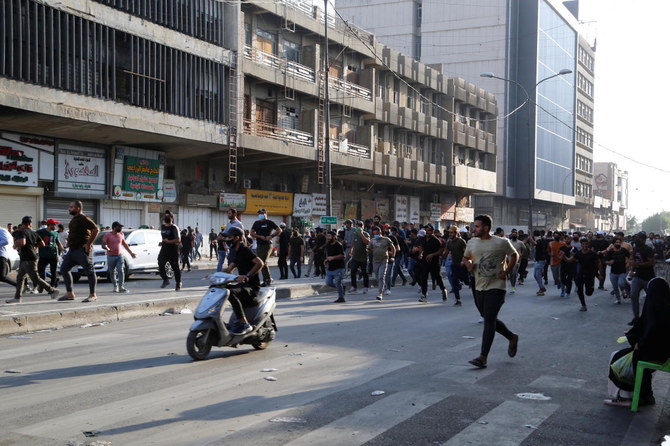BAGHDAD: An Iraqi protester was killed and more than 100 people injured Friday as police clashed with demonstrators venting their fury over last month’s election result, medical and security sources said.
The political arm of the pro-Iran Hashed Al-Shaabi paramilitary network saw its share of parliamentary seats decline substantially in the election, which the group’s supporters have denounced as “fraud.”
On Friday, hundreds of Hashed supporters rallied in Baghdad near the Green Zone, a high-security district that houses the US embassy, government buildings and the election commission.
Demonstrators from groups loyal to the Hashed threw projectiles and “blocked... access to the Green Zone” on three sides, before they were pushed back by police who fired in the air, a security source said, requesting anonymity.
“There were 125 people injured, 27 of them civilians and the rest from the security forces,” the health ministry said.
Later a security source, speaking on condition of anonymity, said a protester had been fatally wounded and died in hospital.
Earlier some pro-Iran channels on messaging app Telegram said police fired live rounds at protesters.
“Two demonstrators were killed,” a leader of the Hezbollah Brigades, one of Hashed’s most powerful factions, told AFP, requesting anonymity.
But the health ministry said no live rounds were fired, insisting that most of those wounded suffered minor injuries.
A Hezbollah Brigade source said that after a brief lull, clashes resumed in the evening near the Green Zone, accusing security forces of torching protester tents in the area.
Prime Minister Mustafa Al-Kadhemi “ordered a full inquiry into Friday’s events,” his office said, while President Barham Saleh urged restraint.
The UN mission in Iraq said it “regrets the escalation of violence and the ensuing injuries in Baghdad today.”
“We call on all sides to exercise maximum restraint, for the right to peaceful protest to be respected and for the demonstrations to remain peaceful.”
The Conquest (Fatah) Alliance, the political arm of the multi-party Hashed, won around 15 of the 329 seats in parliament, according to preliminary results.
In the last parliament it held 48, making it the second-largest bloc.
The big winner this time, with more than 70 seats according to the initial count, was the movement of Moqtada Sadr, a Shiite Muslim preacher who campaigned as a nationalist and critic of Iran.
In a tweet on Friday, Sadr took no side over the clashes, condemning all violence whether from demonstrators or from the security forces.
The security source said that the protesters were mainly drawn from two Hashed factions, the Hezbollah Brigades and Assaib Ahl Al-Haq.
The Hezbollah Brigades dubbed last month’s election the “worst” since 2003, when dictator Saddam Hussein was toppled in a US-led invasion.
The Hashed demands the withdrawal from Iraq of remaining US troops, who number about 2,500.
The troops are deployed in Iraq as part of the coalition that helped Baghdad in the fight against the Daesh group, which the government declared defeated in late 2017.
But the Hashed a-Shaabi, or Popular Mobilization, forces were themselves central to the defeat of IS, after Iraq’s army crumbled in the face of the jihadists’ lightning advance in 2014.
The Hashed were integrated into state security forces and the political arm rode a wave of popularity to perform strongly in the 2018 election.
An unprecedented protest movement broke out in 2019 and railed against the political class running the oil-rich but poverty-stricken country where youth unemployment is soaring.
The election was brought forward as a concession to the protesters, who also complained that Iraq was beholden to Iran.
Factions of the Hashed have faced accusations of targeting activists.
Final election results are expected within weeks. Despite its losses in parliament, the Hashed will remain a political force as the country’s myriad of factions engage in marathon negotiations to form alliances and name a new prime minister.




























